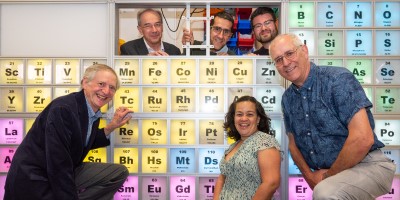In-cell Organometallic Redox Catalysis - RSC Dalton Division Horizon Prize 2022
Discover the work of an international team of scientists, led by the University of Warwick, named the winner of the Royal Society of Chemistry’s Dalton Division Horizon Prize 2022.

The In-cell Organometallic Redox Catalysis Team won the prize for pioneering work on catalysis of redox reactions in cancer cellsLink opens in a new window by synthetic organometallic complexes. The catalysis disturbs the redox balance inside the cell and enhances anticancer activity.
The multidisciplinary team is led by Professors Peter Sadler and Martin Wills at the University of Warwick, and supported by scientists at Chimie ParisTech (PSL University), University of Zürich, Sun Yat-sen University, Heriot Watt University and the Technische Universität Kaiserslautern.
After receiving the prize, Peter Sadler, Professor of Chemistry at the University of Warwick said: “The project demonstrates how research on fundamental questions can lead to applications and goals in cancer treatment. We’re incredibly proud of the results achieved by a team that is collectively motivated to drive chemical research beyond the boundaries of current knowledge by using cutting-edge methods and techniques with the potential to improve lives.”
Natural enzymes, large molecules containing thousands of atoms, catalyse many reactions in our bodies’ cells. The team’s work questioned whether small metal-containing molecules of only tens of atoms synthesised chemically in the lab could also catalyse similar reactions. If successful, potential applications include drugs that could modulate biochemical pathways.
The team synthesised catalysts containing the precious metals ruthenium, osmium and iridium, showing that they can efficiently catalyse reactions of biological importance. This new approach heralds the introduction of new types of medication – novel metallodrugs with minimal side effects for use at very low doses, helping to cure diseases such as cancer that are resistant to current treatments.
